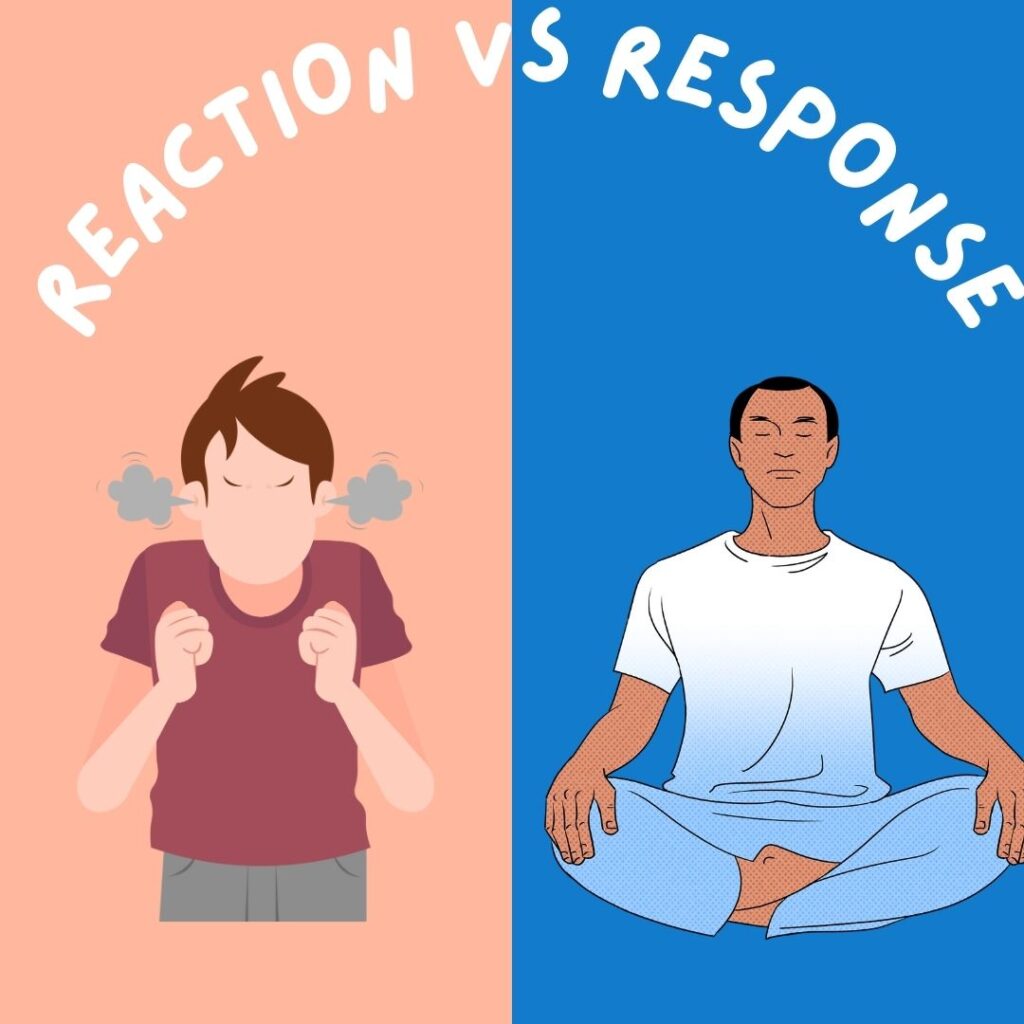In the complex design of human interaction and personal growth, the nuances between reaction and response play a pivotal role.
While these terms are often used interchangeably, understanding the fundamental differences can significantly impact how we deal with challenges and maintain healthy mental and physical health.
In this blog, we explore the difference between reaction and response and how each can significantly impact our health and the choices we make.
The Essence of Reaction:
Reactions are instinctive, automatic, and often driven by our primal instincts.
A reaction is an immediate and involuntary response when faced with a situation.
It tends to be impulsive, fueled by emotions, and can sometimes lack thoughtful consideration.
Reactions are like reflexes, providing swift answers to external stimuli without the engagement of deeper cognitive processes.
Let us see how the reaction affects our health journey
Impulsive Dietary Choices:
– Reacting to cravings or external influences without considering nutritional value can lead to impulsive dietary decisions.
Overreliance on Quick Fixes:
– Seeking rapid solutions, such as crash diets or extreme exercise regimens, as a reaction to immediate health concerns may not provide sustainable results.
Negative Self-Talk:
– Reacting to setbacks during our health journey with self-criticism and negative thoughts can hinder motivation and resilience.
Emotional Eating:
– Turning to food as a reaction to stress, sadness, or boredom without considering nutritional needs can impact overall health.
The Art of Response:
On the other hand, responses involve a more deliberate and thoughtful approach.
A response is a conscious and intentional answer to a stimulus, considering the broader context and potential outcomes.
Responses require a higher level of cognitive processing, enabling us to act with purpose and mindfulness.
Responses in the Health Journey:
Informed Lifestyle Choices:
– Responding to health concerns with well-researched, informed decisions about nutrition, exercise, and overall lifestyle choices.
Sustainable Changes:
– Adopting gradual and sustainable changes to diet and exercise, promoting long-term health rather than seeking quick fixes to our weight issues or health concerns.
Positive Self-Reflection:
– Responding to setbacks with self-reflection, learning, and positive affirmations to foster a healthier mindset.
Mindful Eating:
– Responding to emotional cues with mindful eating, considering nutritional needs and making conscious food choices.
Let us see how we can navigate Health Challenges with the simple action of responding-
Situation 1- You have hit a weight plateau-
- Reaction- Frustration and shortcuts
-Reacting to a weight plateau with frustration may lead to drastic measures like crash diets, potentially causing more harm than good.
- Response: Being patient
-Responding to a weight plateau with a thoughtful analysis of lifestyle factors, adjusting diet and exercise gradually for sustained progress.
Situation 2- You have missed your workout
- Reaction- Guilt and Overtraining-
– Reacting to a missed workout with guilt might lead to overtraining or negative self-perception.
- Response- Patience and planning
– Responding to a missed workout with self-compassion, adjusting the schedule, and ensuring consistency without undue stress.
Developing a Response Mindset:
1.Self-Awareness:
– Develop self-awareness to recognize emotional triggers and habitual reactions to stressors related to your health journey.
Educate Yourself:
– Respond to health challenges by seeking information and understanding about nutrition, exercise, and mental well-being.
Set Realistic Goals:
– Respond to your health aspirations by setting achievable, realistic goals that align with your long-term well-being.
Cultivate Patience:
– Responding to the health journey requires patience. Understand that meaningful changes take time and consistency.
So to sum it up, In the grand tapestry of our lives, the choice between reaction and response can shape our narrative.
In the realm of health, the distinction between reacting and responding can be transformative.
By cultivating a response mindset, you empower yourself to make informed, sustainable choices that contribute to a holistic and enduring health journey.
Remember, the journey is not just about physical transformations,
It is also about fostering a positive relationship with your body and embracing a balanced, healthy lifestyle.

